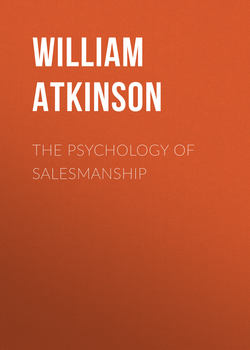The Psychology of Salesmanship

Реклама. ООО «ЛитРес», ИНН: 7719571260.
Оглавление
Atkinson William Walker. The Psychology of Salesmanship
CHAPTER I. PSYCHOLOGY IN BUSINESS
CHAPTER II. THE MIND OF THE SALESMAN
CHAPTER III. THE MIND OF THE SALESMAN (CONTINUED)
CHAPTER IV. THE MIND OF THE BUYER
CHAPTER V. THE MIND OF THE BUYER (CONTINUED)
CHAPTER VI. THE PRE-APPROACH
CHAPTER VII. THE PSYCHOLOGY OF PURCHASE
CHAPTER VIII. THE APPROACH
CHAPTER IX. THE DEMONSTRATION
CHAPTER X. THE CLOSING
Отрывок из книги
In the Psychology of Salesmanship there are two important elements, viz: (1) The Mind of the Salesman; and (2) the Mind of the Buyer. The proposition, or the goods to be sold, constitute the connecting link between the two Minds, or the common point upon which the two Minds must unite, blend, and come to agreement. The Sale itself is the result of the fusion and agreement of the two Minds – the product of the action and reaction between them. Let us now proceed to a consideration of the two important elements, the Two Minds involved in the process of Salesmanship.
Beginning our consideration of the Mind of the Salesman, let us realize that upon his mind depends his character and personality. His character is composed of his individual mental qualities or attributes. His personality is his customary outward expression of his character. Both character and personality may be altered, changed and improved. And there is in each person a central something which he calls "I," which is able to order and manifest these changes in his character and personality. While it may be argued plausibly that a man is merely a composite of his characteristics and nothing more, nevertheless there is always in each the consciousness that in his real "I" there is a something which is above and behind characteristics, and which may regulate the latter. Without attempting to lead the reader into the maze of metaphysics, or the pitfalls of philosophy, we wish to impress upon him the fact that his mental being has for its innermost centre of consciousness this mysterious "I," the nature of which no one has ever been able to determine, but which when fully realized imparts to one a strength and force undreamed of before.
.....
Well, here is the point —be a Mental Gyroscope. Cultivate the mental quality which acts automatically in the direction of keeping your balance and centre of mental gravity. This does not mean that you should be a prig, or a solemn-faced smug bore, with an assumption of supernatural dignity. On the contrary, always be natural in manner and action. The point is to always maintain your balance, and mental control, instead of allowing your feelings or emotions to run away with you. Poise means Mastery – lack of it means Slavery. As Edward Carpenter says: "How rare indeed to meet a man! How common rather to discover a creature hounded on by tyrant thoughts (or cares, or desires), cowering, wincing under the lash – or perchance priding himself to run merrily in obedience to a driver that rattles the reins and persuades himself that he is free." Poise is the Mental Gyroscope – keep it in good working order.
III. Cheerfulness. The "bright, cheerful and happy" mental attitude, and the outward manifestation of the same, is a magnet of success to the salesman. The "grouch" is the negative pole of personality, and does more to repel people than almost any other quality. So much in demand is the cheerful demeanor and mental state, that people often give undue preference to those possessing it, and pass over a "grouchy" individual of merit in favor of the man of less merit but who possesses the "sunshine" in his personality. The "man with the southern exposure" is in demand. There is enough in the world to depress people without having gloom thrust upon them by persons calling to sell goods. Well has the poet said:
.....